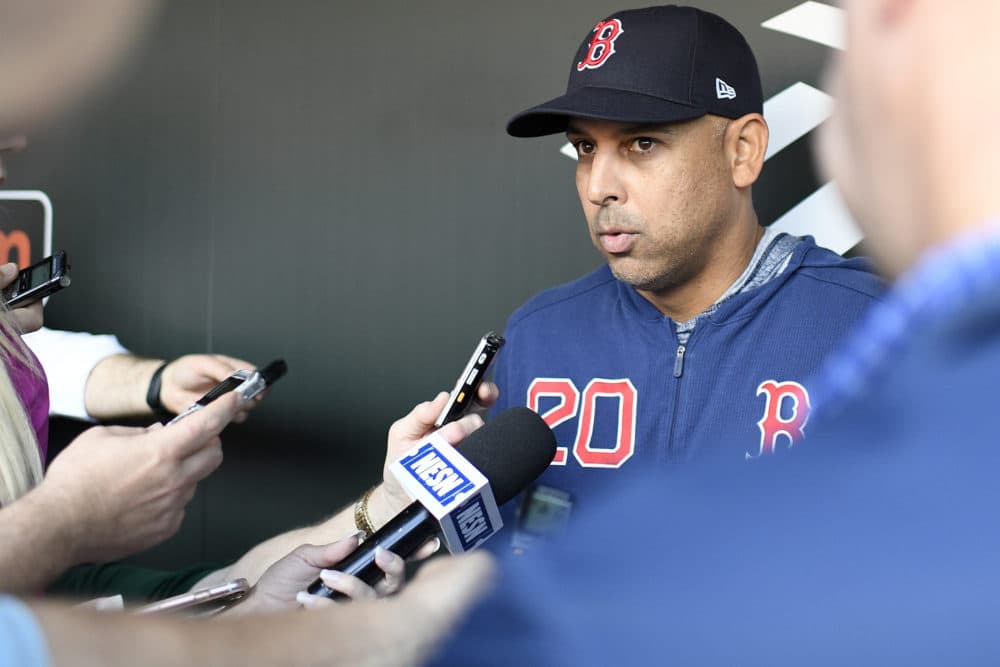Advertisement
With White House Visit, Red Sox Can't Avoid Politics

In January 1963, when the Celtics visited the White House, it wasn’t for some big celebratory ceremony. The reigning NBA champions went for a tour.
When President John F. Kennedy heard the Celtics had stopped by, he invited them to the Oval Office. An impromptu meet-and-greet followed. Photos of the moment show Kennedy standing beside coach Red Auerbach and legendary players like Bob Cousy, John Havlicek, K.C. Jones, Tommy Heinsohn and Satch Sanders.
One notable absence: Bill Russell. Teammates told The Associated Press that Russell didn’t know the Celtics would meet the president and he overslept.
That’s how the first visit between a U.S. president and an NBA championship team went down. Until recently, details of the Celtics visit were largely relegated to sports history trivia. Now, those details highlight how much has changed.
On Thursday, President Trump will welcome the Red Sox. It will be a highly publicized and highly scrutinized celebration of the team’s 2018 World Series championship. Big names, including manager Alex Cora and several of the Red Sox's most prominent players of color, will be missing from the photo op. Meanwhile, several of the Red Sox's most prominent white players will be there, standing beside Trump in the Rose Garden.
Initially, Cora planned on going to the White House. But after talking with his family, he changed his mind. The Trump administration’s poor handling of Hurricane Maria relief motivated his decision.
Earlier this week, in a statement to the Puerto Rican newspaper El Nuevo Dia, Cora said, “Unfortunately, we are still struggling, still fighting. Some people still lack basic necessities, others remain without electricity and many homes and schools are in pretty bad shape almost a year and a half after Hurricane Maria struck.
“I’ve used my voice on many occasions so that Puerto Ricans are not forgotten, and my absence is no different. As such, at this moment, I don’t feel comfortable celebrating in the White House.”
In addition to Cora, reigning American League MVP Mookie Betts, outfielder Jackie Bradley, Jr., shortstop Xander Bogaerts, third baseman Rafael Devers, pitchers David Price and Hector Velázquez and catchers Christian Vazquez and Sandy León won’t be at the White House.
Advertisement
With the exception of Velázquez, the players have chosen not to elaborate on why they’re skipping the visit. Bradley said he “prefers not to get into politics.” Price said he’s not going because, “it’s baseball season.” Devers said, “The opportunity was presented and I just wasn’t compelled to go.”
Velázquez, however, made it clear that his decision was linked to Trump’s comments about Mexico.
“I made the choice not to go because, as we know, the president has said a lot of stuff about Mexico,” the pitcher said through a translator, according to MassLive. “And I have a lot of people in Mexico that are fans of me, that follow me. And I’m from there. So, I would rather not offend anyone over there.”
Red Sox executives would prefer to keep politics separate from the visit. Still, team President Sam Kennedy supports Cora’s decision and believes the Red Sox have a culture where players feel free to make their own individual decisions.
When asked if he is worried the White House visit would become divisive, Kennedy told NESN: “It is an honor for the Boston Red Sox to be invited to the White House, to be recognized for our World Series championship. We need to make this apolitical. We need to make this about the players. Those who want to go, will go. Those who don’t want to go, don’t have to go. That is what we did in 2005 after the championship, 2008, 2014."
He added: “It’s not about an individual president or policy. We went under Bush. We went [under] Obama. We’re going under Trump. And I hope we’re going again under Trump. Let’s keep this thing going. These are great problems, controversies to have. I will take this controversy every single year. Sign up for it right now.”
They may be great controversies to have, but they’re still controversies. And they create the kind of headlines and optics and Twitterstorms the Red Sox would rather not face. That’s especially true when it comes to the racial divide between the team members going and not going.
Consider what happened earlier this week. On Sunday, The Athletic’s Steve Buckley tweeted, “Alex Cora has confirmed newspaper report he will not make the trip to meet the president. So basically it’s the white Sox who’ll be going,” Price quote-tweeted Buckley with the message, “I just feel like more than 38k should see this tweet … .” The 38,000 was a reference to Buckley’s number of followers. It appeared Price was endorsing the “white Sox” tweet and drawing attention to a racial divide on the Red Sox. Then, Price clarified what he meant, telling The Boston Globe that he saw it as “an insensitive tweet.”
As much as the Red Sox executives would prefer that their White House visit be divorced from politics, it’s impossible given the current U.S. president and his penchant for sports commentary. Trump criticized NFL players who kneeled during the National Anthem to raise awareness of racial and social injustice. He withdrew a White House invitation to the NBA-champion Golden State Warriors after players spoke out against his leadership. Most recently, he blamed the disqualification of the first horse across the finish line in the Kentucky Derby on “political correctness.”
Given recent history, when Trump greets some of the Red Sox on Thursday, it’s almost certain to get awkward before the fast food is served.
This segment aired on May 9, 2019.
